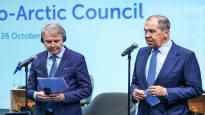Almost 130 projects in the Arctic Council are on ice when there is no desire to continue cooperation with Russia now. In threats, the Arctic region would split in two, but it is still considered unlikely.
Finland’s and Sweden’s NATO membership could also have an impact on Arctic co-operation, Russian media reported on Friday.
– It must be understood that a change in the military-political status of the countries would lead to certain adjustments in the development of northern co-operation. Time will tell what the consequences will be, Russia’s top Arctic official Nikolai Korchunov told a news conference Ria Novostin (switch to another service) by.
If Finland and Sweden joined NATO, the Arctic Council of the eight countries would in future consist of seven NATO countries and Russia. Other member states are the United States, Canada, Denmark (Greenland), Norway and Iceland.
Finland’s Arctic Ambassador Petteri Vuorimäki does not believe that NATO enlargement will increase tensions in the Arctic Council.
– Issues related to high security are not included in the mandate of the Arctic Council, Vuorimäki explains.
After the conquest of Crimea, co-operation with Russia continued, despite a critical debate. As early as the 1990s, it was outlined that the policy of great powers should be kept out of Arctic co-operation. Russia has also pleaded this when it hoped the Arctic countries would return to the table again last week.
Climate crisis at the heart of the Council’s work
Russia considers NATO a hostile organization. Vuorimäki hopes that Russia’s distrust of Arctic co-operation, which focuses on combating climate change and the position of indigenous peoples, will not be spilled.
– It would be in everyone’s interest that other things would not affect the co-operation or that it would not become more difficult when the co-operation can be continued, Vuorimäki says.
Arctic Center Research Professor Timo Koivurovan According to Russia, there is still room for win in Arctic policy, especially in the area of cooperation. Most of the Arctic belongs to Russia.
– Russia benefits from international rules in the Arctic. For example, the UN Convention on the Law of the Sea protects vast areas of the Arctic continental shelf, Koivurova says.
According to Koivurova, the military threats in the Arctic are primarily related to the fact that the increasing military activity in the region inadvertently leads to misunderstandings and thus to collisions.
– Sovereignty is very clear among the Arctic states. It is difficult to outline military goals for Russia in the Arctic, Koivurova says.
The Arctic Council has been stuck for three months now
The Arctic Council has about 130 different projects in progress, including climate change, biodiversity, indigenous peoples and sustainable development. They have not progressed since seven Member States suspended their participation in the Council on 3 March.
For example, studies related to climate change have been left unfinished.
– Regarding black coal and methane, we would have liked to discuss more ambitious goals, Vuorimäki says.
Koivurova believes that the Arctic Council’s co-operation will continue without Russia, because projects cannot be left on the table for too long. According to him, most of the Arctic Council’s projects can be carried out without Russia, as the country is involved in only a fraction of the Council’s projects.
The Russian presidency will continue until May 2023, after which it will be transferred to Norway.
Can the Arctic differ?
Russia controls up to half of the Arctic coast. Some scholars have even suspected that the Arctic could be divided into the western and Russian-administered eastern parts of the Arctic Council.
The latter theory has gained momentum as Russia has been seen to have moved closer to China, especially since the occupation of Crimea (2014).
There has also been speculation that observer members of the Arctic Council, China and India, could be Russia’s future Arctic partners. China has already pumped natural gas in the Yamal Peninsula in cooperation with Russia.
However, Koivurova himself does not believe in the division of the Arctic region. He is confident that Russia will return to the Arctic Council at some point.
Vuorimäki is on the same lines.
– It is more a question of when co-operation with Russia can be organized, how long it will take and what will be done in the meantime. I cannot consider such a scenario that permanent competing structures would enter the Arctic, Vuorimäki says.
What thoughts did the story provoke? You can participate in the discussion with ID 26.5. until 11 p.m.
